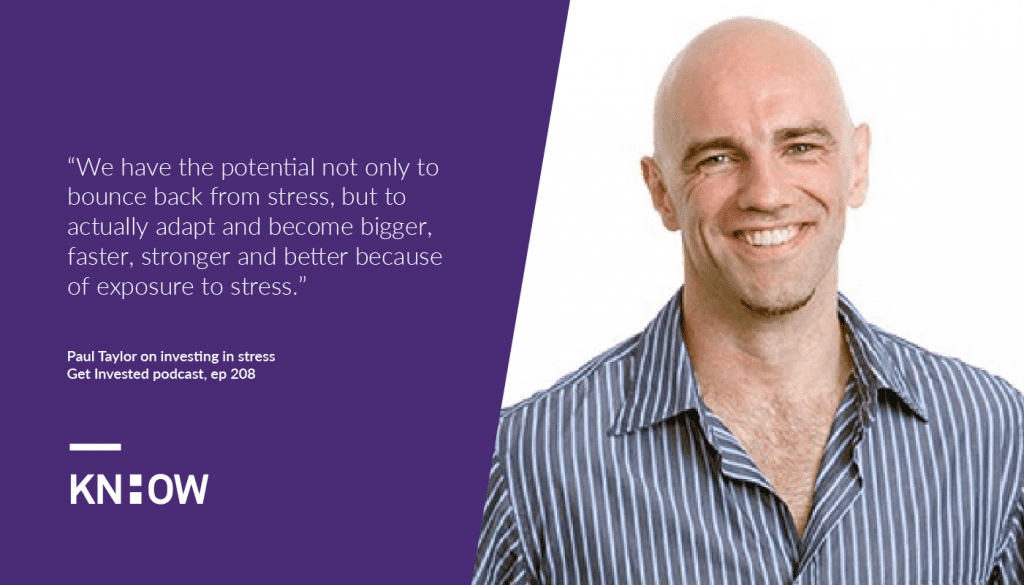Exercise physiologist, nutritionist and neuroscientist Paul Taylor says the stress of stepping out of your comfort zone provides an opportunity for growth and, when managed well, can unlock many benefits.
There is no denying stress is a serious problem that can lead to depression, anxiety, various health-related problems and even death.
But what if taking on stress from a different perspective could bring different results? What if stress isn’t always an evil that needs to be eliminated, avoided and reduced at all costs?
Paul Taylor, who along with his many qualifications and experiences is a former British Royal Navy Aircrew Officer, says stress is something that, if managed right, can build character and develop an incredible resilience that will drive you through any personal, work-related or financial challenge.
Paul told KnowHow founder Bushy Martin on the Get Invested podcast that if stress is taken on with a determined attitude and a positive mindset, it will lead to high performance and the ability to manage any situation, including the current global crises.
“We are ancient bodies and brains in a modern world, right? And one of the reasons we became the dominant species on Earth was because we adapted better to changes in the environment and stressors than other species. And that ability to adapt to stress has actually driven us on,” Paul said.
“A lot of people talk about resilience and bouncing back from stress, and I think that under cooks our potential. We have the potential not only to bounce back from stress, but to actually adapt to it to become bigger, faster, stronger and better because of exposure to stress, and this is something I’m very passionate about.
“So this whole seeking to avoid stress and to embrace comfort is something that is in our biology, and that’s useful when we live in a highly stressful, uncomfortable world. But we’re now plonked in a world where you can have pleasure and comfort everywhere and you can avoid stress, that’s not a good thing.”
Paul explained that it’s primarily about changing your perception of stress from something that’s debilitating and victimising, to a challenge to overcome and learn from.
“The obstacle is looking at stress as a challenge rather than a stress. When I was in the military, people didn’t talk about stress. They talked about challenges. And it turns out that how you frame it is really, really important,” Paul said.
“Even when you have these massive challenges that you can’t do something about, they just become an opportunity to sharpen your character or practice a virtue. So if we look at COVID – you can’t deal with it and you can’t stop the lockdowns that we’ve been having. But you can use that as an opportunity to sharpen your character, to actually go out and help other people, and to practice a virtue of tolerance and patience in these sorts of things.”
This mindset will then allow you to train your stress response system and appropriately respond to different stressors.
“If you’re telling yourself that this is a challenge that you want to go and meet, it can actually tweak how high your body actually responds physiologically to that,” Paul revealed.
“Then when you’re exposing yourself to stress with adequate recovery – and that’s really, really important because a lot of people don’t recover well – then your stress response system starts to be trained in that it can activate really quickly, which is a good thing. Anxious people also activate their stress response systems really quickly, but the problem with them is they have an inability to turn it off,” he said.
A key technique of tackling stress is to look at everything in ‘two zones’.
“Everything in your life is in two zones. Zone One is the stuff that’s within your will or within your power. Things like what we choose to have as our belief system, what we choose to be afraid of, but also our behaviours, our actions and how we choose to react to our circumstance. Then everything else is Zone Two,” Paul explained.
“When you’re faced with challenges, we must focus on that which we can control, which is basically our attitudes, and we must refuse to invest our energy in this stuff that we can’t control. And I think that’s really important to actually go, is this Zone One? Is this Zone Two? And I need to focus all my energy on Zone One rather than playing the victim, blaming other people and raging at whoever it may be (which is all Zone Two stuff). We’ve just got to get on with things.
“So it’s about our ability to choose how we react to our circumstances, to choose our own attitude, to choose our own way.”
Paul said stress-related decisions should always be guided by your values and goals.
“We have a choice. We can either an away move or a towards move. So an away move is something that’s taking you away from the person that you want to be or your goals, and that towards move is a move that’s taking it towards the person you want to be or your goals. And linking that to your values is really important,” he said.
“So when you come up with a potentially stressful situation, you can either go and hide from it and play the victim (that’s an away move), or you can actually view it as a challenge and bring your best self to try and deal with that situation, which is a towards move.
“We have all of these throughout our life … but it’s when you connect it to your values that it makes it actually easier to do so. So I think that’s a really useful tool.”
Listen to the full interview here.
Want to Know How you can build wealth with the help of leading, qualified experts? Talk to the team at KnowHow, now.




